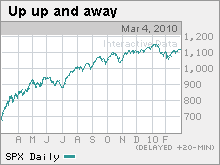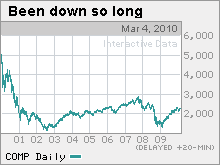Search News
NEW YORK (CNNMoney.com) -- There are two big investing anniversaries coming up, and they represent the best of those two opposing market forces: Fear and greed.
It was almost a year ago that the stock market hit bottom. Take your pick on which panic-stricken day to celebrate. The S&P 500 hit a demonic intra-day low of 666 on March 6, and a closing low on March 9. There's your fear.

 |
| The broader market has staged a stunning comeback from the depth's of last year's panic. |
 |
| But tech stocks are still well below the all-time highs they hit during the dot-com euphoria ten years ago. |
Now, if you want to feel old, here's your greed. It was nearly 10 years ago (10!) that the Nasdaq hit its all-time high. At the end of the dot-com frenzy, the tech-laden index closed at 5,048 on March 10, 2000. It actually went as high as 5,132 that day.
Did these events teach investors anything? Maybe not. While the sell-off early last year was arguably overdone, it's safe to wonder if the nearly 70% surge since then is nothing more than the inflating of another bubble.
"This is a case of lessons we are yet again not learning," said Liz Ann Sonders, chief investment strategist with Charles Schwab & Co. "Investors have made the same mistake of betting on past performance."
The stock market has surged due to a sense that the worst is over for the economy. With that in mind, Sonders said she's more concerned about another market "meltup" as opposed to an imminent "meltdown."
She said that money that's still sitting in Treasurys and other fixed-income assets could get plowed into stocks, which would further fuel a market rally that is a bit ahead of itself.
"Even being optimistic, 2010 should be a choppier year for stocks. The easy money has already been made," Sonders said.
Alan Gayle, senior investment strategist with RidgeWorth Investments in Richmond, Va., agreed that there is a risk of history repeating itself.
"The bubble game seems to move around. Investors always want to seek the highest possible returns and still suffer from the worry of being left out," Gayle said.
"That happened with tech stocks at the end of 1990s. We then went through that with real estate," he added. "Now everybody is trying to recover lost 401(k) values. There is a strong desire to seek out a quick fix and that leads investors to momentum trades that often become unsustainable."
To be fair, there is one significant difference between the stock market now and 2000. Valuations for many blue-chip companies are reasonable. They're not necessarily cheap, but the froth that existed in 2000 is gone.
"Ten years ago we had dirt cheap stocks, outrageously expensive stocks and not much in between," said James Denney, portfolio manager with Mohawk Capital Management in Schenectady, N.Y. "Now you don't have as much of the extremes."
That is a great point. Think of the hot tech stocks of 2010. For one, they are all profitable companies. And they don't obscene P/Es above 100.
Cisco Systems (CSCO, Fortune 500), whose stock has nearly doubled from a year ago, still only trades at about 16 times fiscal 2010 earnings estimates. Apple (AAPL, Fortune 500) trades for just 18 times fiscal 2010 earnings estimates while Google (GOOG, Fortune 500) is valued at 20 times earnings estimates for this year.
As such, Denney said that last year's panic was a good thing for investors seeking to buy quality stocks at a good value. He said that he bought several companies a year ago that he had never owned before because he always thought they were too expensive, such as Dow Chemical (DOW, Fortune 500), 3M (MMM, Fortune 500), Nike (NKE, Fortune 500) and Johnson & Johnson (JNJ, Fortune 500).
Denney said he's hopeful people have learned that the smart thing to do is to buy quality companies with strong balance sheets and healthy dividends that trade at reasonable prices.
But Gayle takes it one step further. He said people need to realize that sometimes stocks are cheap for a reason and that the biggest risk for investors is getting caught in a selling stampede when sentiment turns.
History has definitely shown -- as recently as last year -- that investor panics can be as irrational as bubbles.
"You can look at valuations, but if the markets are not functioning well, valuations fly out the window. Cheap is not enough if the markets aren't functioning," he said. "When everybody starts heading for the exits, there's not enough room for everybody to get out."
-- The opinions expressed in this commentary are solely those of Paul R. La Monica. ![]()



| Overnight Avg Rate | Latest | Change | Last Week |
|---|---|---|---|
| 30 yr fixed | 3.80% | 3.88% | |
| 15 yr fixed | 3.20% | 3.23% | |
| 5/1 ARM | 3.84% | 3.88% | |
| 30 yr refi | 3.82% | 3.93% | |
| 15 yr refi | 3.20% | 3.23% |
Today's featured rates:



| Index | Last | Change | % Change |
|---|---|---|---|
| Dow | 32,627.97 | -234.33 | -0.71% |
| Nasdaq | 13,215.24 | 99.07 | 0.76% |
| S&P 500 | 3,913.10 | -2.36 | -0.06% |
| Treasuries | 1.73 | 0.00 | 0.12% |
| Company | Price | Change | % Change |
|---|---|---|---|
| Ford Motor Co | 8.29 | 0.05 | 0.61% |
| Advanced Micro Devic... | 54.59 | 0.70 | 1.30% |
| Cisco Systems Inc | 47.49 | -2.44 | -4.89% |
| General Electric Co | 13.00 | -0.16 | -1.22% |
| Kraft Heinz Co | 27.84 | -2.20 | -7.32% |
|
Bankrupt toy retailer tells bankruptcy court it is looking at possibly reviving the Toys 'R' Us and Babies 'R' Us brands. More |
Land O'Lakes CEO Beth Ford charts her career path, from her first job to becoming the first openly gay CEO at a Fortune 500 company in an interview with CNN's Boss Files. More |
Honda and General Motors are creating a new generation of fully autonomous vehicles. More |
In 1998, Ntsiki Biyela won a scholarship to study wine making. Now she's about to launch her own brand. More |
Whether you hedge inflation or look for a return that outpaces inflation, here's how to prepare. More |